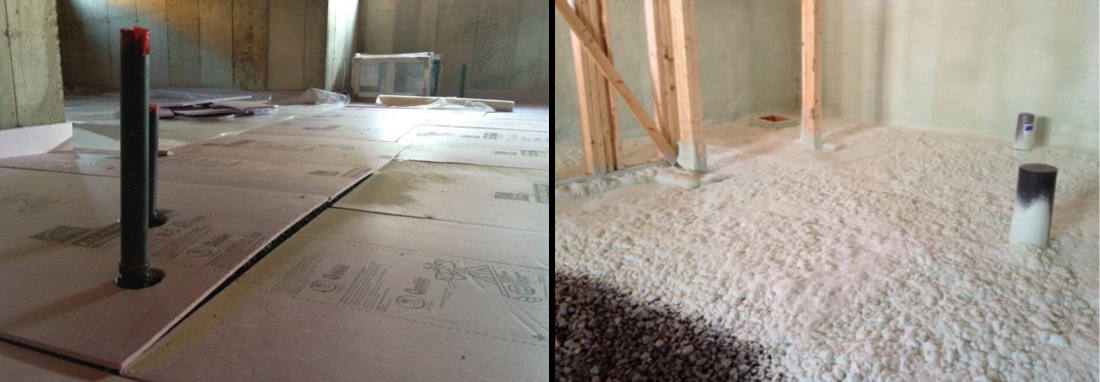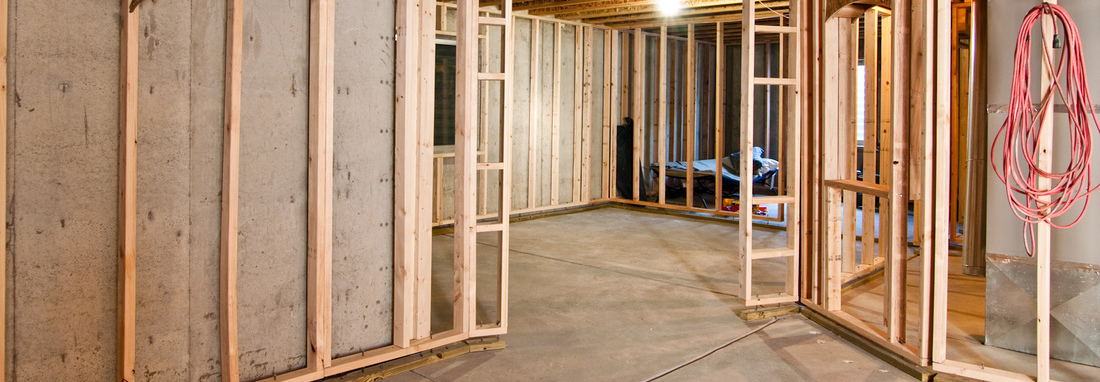Basement Insulation
Your basement is a large area that is critical to your insulation: according to Canada’s Office of Energy Efficiency, an uninsulated basement increases energy consumption by 25% or more!
With the new thermal insulation standards, you must insulate your basement, whether you intend to finish it or not!
Most rigid insulation products do not eliminate air infiltration. The result is heat loss and risks of condensation and mould.
Another major problem with polystyrene sheets: the joints between end joists and the foundation walls. Only sprayed urethane can perfectly seal the space between these two components.
Also see: Home insulation, wall insulation, attic & roof insulation, floor & ceiling insulation and urethane & polyurethane foam insulation
Sprayed polyurethane foam: its high expansion and adherence factors make it possible to perfectly seal all types of surfaces – including concrete, which is a porous, uneven and conductive substrate.
A single application is enough to meet RBQ standards. Additional features of sprayed polyurethane foam include:
- Continuous insulation from the slab to the end joist
- A perfectly sealed substrate
- Radon protection
- Superior insulation properties
- A turnkey project!
Our answers to a few frequently asked questions:
- “Should I start from the inside or the outside?” We recommend that you insulate from the inside: this will spare you the expense of heating the mass of concrete unnecessarily.
- “Should I use fiberglass batts?” With conductor materials such as concrete and steel, we don’t recommend it!
- “What about the end joist?” Only urethane makes it possible to properly secure the end joist to the foundation walls and seal the space between the two.
Insulation example
- End joists: 3.5 inches of sprayed polyurethane foam
- Foundation wall: 2.5 inches of sprayed polyurethane foam
- Basement slab: 2.0 inches of sprayed polyurethane foam *.
(* Also protects against soil gases, including radon)
Before mounting your basement walls, we recommend applying sprayed polyurethane foam, to avoid thermal bridges.
The application of 2.5 inches of sprayed polyurethane foam allows you to:
- Ensure continuous insulation between the slab and the end joist
- Perfectly seal off the foundation against leakages
- Considerably reduce the risk of condensation, compared to conventional insulation
Also, sprayed polyurethane foam:
- Ensures a uniform coating, for uniform performance
- Allows wires to pass through
- Makes future additions and changes easier
For assured comfort and energy savings, this space should be heated, and its walls need to be insulated. Among other benefits, this will keep your feet warm!
Steel structure elements – and even some solid wood elements – are conductors, and they can conduct cold air from the outside and be a source of condensation.
These structural elements are often located in cramped areas, and spraying polyurethane foam is recommended, given its high R-value and adhesive properties.
The underside of the foundation slab should be insulated (at least an R-value of 5 across the entire surface). You must also include protection against soil gases, especially radon, in order to comply with RBQ requirements (see the Quebec Building Code, Article 9.13.4 – available in French only).
A widespread “insulation solution” involves placing polystyrene sheets and a vapor barrier under the basement slab.
However, this combination poses several problems, particularly regarding radon infiltration:
- Ensuring seamless, continuous insulation proves to be very difficult.
- It is precarious, and prone to shifting when the concrete slab is poured.
- It is very difficult to correctly fasten the polystyrene sheets to the foundation walls – under the concrete slab – and seal the whole thing off.
- The same difficulty arises when the time comes to seal the joint between the foundation walls and the end joist.
This explains why this type of insulation is ineffective, especially against radon infiltration.
According to Isolation Majeau, only one type of insulation effectively attaches and seamlessly seals the concrete slab to the end joist: sprayed polyurethane foam.




